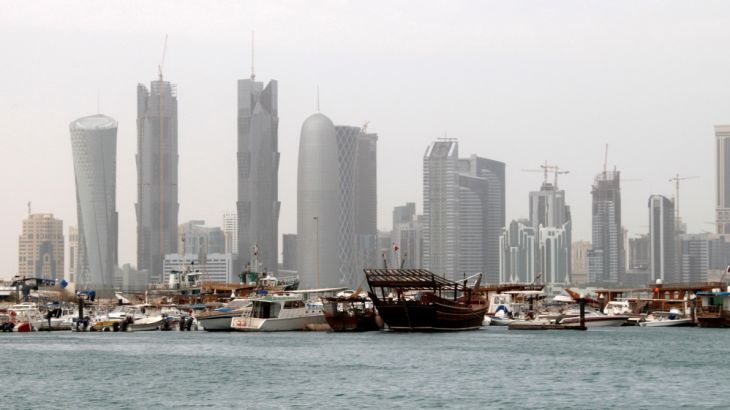Donald Trump seeks increased ‘anti-terror efforts’
US president wants Qatar ‘back among unity of responsible nations’ while secretary of state seeks easing of blockade.

The US administration has sent mixed signals to Arab Gulf countries amid one of the biggest diplomatic crises gripping the region.
Speaking at the White House Rose Garden on Friday, President Donald Trump called on Qatar and other countries to increase their efforts against “terrorism”.
Keep reading
list of 4 itemsQatar emir condemns ‘genocide’ in Gaza, urges ceasefire at GCC summit
‘Enduring commitment’: Key takeaways from US-GCC joint statement
Analysis: Efforts to end Assad isolation gather speed after quake
“Qatar, we want you back among the unity of responsible nations,” Trump said. “We ask Qatar and other nations in the region to do more [to combat terrorism] – and do it faster.”
Just minutes earlier, Rex Tillerson, US secretary of state, urged Saudi Arabia and three other Arab states to ease their blockade of Qatar, which was imposed on Monday allegedly because Doha supports “extremism”.
|
|
Saudi Arabia, Bahrain, the UAE, and Egypt cut diplomatic ties and transport links with Qatar, closed air, land and sea borders, and sent the Gulf Cooperation Council (GCC) countries into their biggest crisis in years.
In a statement on Friday, the Qatari government said it has been leading the region in attacking what it called the roots of “terrorism”, including giving young people hope through jobs, educating hundreds of thousands of Syrian refugees, and funding community programmes to challenge agendas of armed groups.
“Our position on countering terrorism is stronger than many of the signatories of the joint statement – a fact that has been conveniently ignored by the authors,” the statement said.
READ MORE: Qatar-Gulf crisis: All the latest updates
However, in his remarks on Friday, Trump said “the nation of Qatar has historically been a funder of terrorism at a very high level”, but he failed to provide any evidence.
He said while visiting Saudi Arabia, “nations came to me and spoke about confronting Qatar over its behaviour. So we had a decision to make: Do we take the easy road or do we take hard but necessary action?”
Trump further called on “all nations to stop immediately supporting terrorism. Stop teaching people to kill other people. Stop filling their minds with hate and intolerance.”
‘Unintended consequences’
Tillerson, for his part, said the blockade has caused “unintended” consequences and is “hindering US military actions in the region and the campaign against ISIS”, referring to the Islamic State of Iraq and the Levant (ISIL, known as ISIS).
“We call on the Kingdom of Saudi Arabia, the United Arab Emirates, Bahrain and Egypt to ease the blockade on Qatar,” Tillerson said.
“We’re seeing shortages of food [in Qatar], families are being forcibly separated, and children pulled out of school – we believe these are unintended consequences, especially during this holy month of Ramadan, but they can be addressed immediately,” he said.
The UAE said Qatar must acknowledge concerns about its “troubling support for extremism”, the UAE’s ambassador to the United States said on Friday.
“The UAE welcomes President Trump’s leadership in challenging Qatar’s troubling support for extremism. The next step is for Qatar to acknowledge these concerns and commit to re-examine its regional policies,” Ambassador Yousef al-Otaiba said in a statement seen by Reuters news agency.
“This will provide the necessary basis for any discussions,” Otaiba added.
|
|